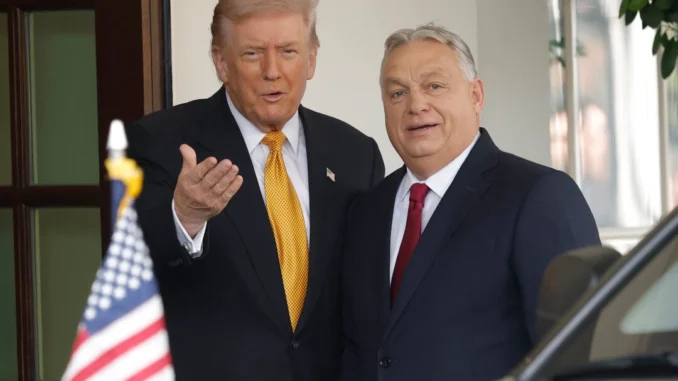
In a significant move for global energy dynamics, U.S. President Donald Trump has granted Hungary a one-year exemption from U.S. sanctions on Russian oil and gas imports.
This decision came following a high-profile meeting at the White House with Hungarian Prime Minister Viktor Orbán, a longtime ally of Trump. The exemption allows Hungary, which relies heavily on Russian energy—accounting for 74% of its gas and 86% of its oil in 2024—to continue these purchases without facing penalties, averting what Orbán described as a potential economic catastrophe for his landlocked nation.
Ratings agency S&P has noted that Hungary has one of the most energy-intensive economies in Europe, with its refineries optimized for Russian Urals crude.
This carve-out softens the impact of recent U.S. sanctions imposed on Russian oil giants Lukoil and Rosneft, which were designed to restrict Moscow’s revenue streams funding its war in Ukraine.
Orbán, who has maintained close ties with Russia despite EU and NATO criticism, had lobbied Trump for relief, arguing that alternative energy sources are logistically challenging for Hungary due to its geography.
Trump expressed sympathy during the meeting, highlighting Europe’s ongoing purchases of Russian energy and questioning the consistency of sanctions enforcement.
Key Accomplishments from the White House Meeting
|
Accomplishment
|
Details
|
|---|---|
|
Sanctions Exemption
|
One-year waiver for Hungary to import Russian oil via the Druzhba pipeline and gas via TurkStream, ensuring energy security without U.S. penalties.
aljazeera.com
|
|
U.S. LNG Purchases
|
Hungary committed to buying U.S. liquefied natural gas (LNG) contracts valued at approximately $600 million, boosting U.S. exports and diversifying Hungary’s energy mix.
theguardian.com
|
|
Nuclear Cooperation
|
Signed a memorandum for U.S.-Hungary collaboration in civil nuclear energy, including plans for 10 small modular reactors in Budapest valued at $20 billion. Hungary will also purchase nuclear fuel from U.S.-based Westinghouse for its Paks plant, though it will continue some Russian fuel imports.
politico.com
|
|
Ukraine War Discussions
|
The leaders exchanged views on the ongoing conflict, with Orbán dismissing Ukraine’s chances of victory and Trump reiterating interest in a potential summit with Russian President Vladimir Putin in Budapest (currently on hold after Russia’s rejection of a ceasefire).
cnbc.com
Orbán positioned Trump as one of the few leaders serious about peace. |
|
Broader Ties
|
Trump praised Orbán’s hardline stance on immigration, calling him a “great leader.” The meeting also highlighted improved U.S.-Hungary relations, including the recent restoration of Hungary’s visa waiver program status.
abcnews.go.com
|
This meeting marks the first White House visit for Orbán in Trump’s second term and underscores their shared conservative priorities.
Hungarian Foreign Minister Péter Szijjártó hailed the exemption as a guarantee for Hungary’s energy security.
However, the decision has drawn scrutiny for potentially undermining U.S. efforts to isolate Russia economically, especially as Trump pushes Europe to reduce Russian energy dependence.
The Epoch Times article from earlier coverage highlighted Trump’s initial consideration of such an exemption during Orbán’s visit, noting the geopolitical tensions and Hungary’s pushback against EU plans to phase out Russian gas by 2027.
What was then a possibility has now materialized as a one-year reprieve, reflecting the rapid evolution of U.S. policy in this area.
EU Deindustrialization Amid Net Zero Policies
The Hungary exemption comes against a backdrop of broader energy challenges in the European Union, where aggressive Net Zero policies—aiming for 55% emissions reductions by 2030 and carbon neutrality by 2050—have contributed to soaring energy costs and industrial decline.
Europe’s electricity prices have tripled pre-pandemic levels in some cases, leading to deindustrialization as manufacturers relocate to regions with cheaper energy, such as the U.S. or Asia.
Key factors include:
High Energy Costs: Post-2022 Ukraine invasion, Europe’s reliance on Russian gas was disrupted, spiking prices and erasing the bloc’s long-standing current account surplus through massive energy imports.
Industrial electricity use has collapsed, with Germany’s energy-intensive sectors seeing a 13% production drop in early 2023.
Regulatory Burdens: The European Green Deal and initiatives like the Net Zero Industry Act impose heavy compliance costs, including due diligence requirements under the Corporate Sustainability Due Diligence Directive.
These have deterred investments, with trade unions warning of job losses in sectors like metallurgy, automotive, and chemicals.
Sector Impacts: Energy-intensive industries, employing millions, face shutdowns or reduced capacity. For instance, Slovakia’s largest aluminum smelter closed due to high power costs.
Germany, Europe’s industrial powerhouse, has seen bankruptcies rise and output losses potentially exceeding 4% of GDP from gas cutoffs alone.
Italy’s story mirrors this, with businesses fleeing high costs double those in the U.S.
Investment Gaps: To meet Net Zero goals, the EU needs massive funding—estimated at €300-543 billion for low-emission hydrogen alone over the next decade—but current policies lack sufficient support, risking further economic decline and emissions leakage abroad.
Critics argue that while Net Zero addresses climate needs, it has exposed structural weaknesses, including disrupted supply chains and policy divergences among member states.
The U.S. Inflation Reduction Act has accelerated this by offering incentives that lure European firms stateside.
A Looming Existential Question for the EU
As Hungary secures its energy lifeline outside the EU’s unified front, broader tensions emerge. The bloc’s push to phase out Russian imports by 2027 clashes with members like Hungary, deepening rifts with Brussels.
Combined with deindustrialization, this raises a critical query: Is the EU’s Net Zero and Geopolitical Sanctions Situation the potential end of the EU as an organization’s value as a trading block?
The EU’s ability to balance environmental ambitions with economic competitiveness and energy security will determine its future cohesion and global standing. For now, moves like the U.S.-Hungary deal highlight how individual nations are navigating these pressures independently, potentially fragmenting the bloc’s unified trade power.
Got Questions on investing in oil and gas? Or do you have a Tax Burden in 2025?
ENB Top News
ENB
Energy Dashboard
ENB Podcast
ENB Substack






Be the first to comment